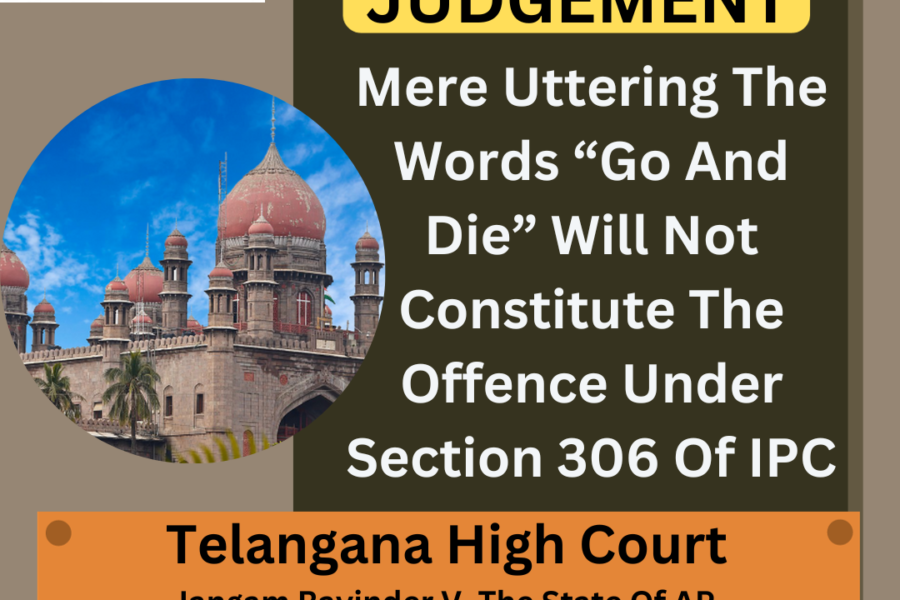The act of mentally inspiring, supporting, or assisting someone in committing suicide is known as suicide abetment. A conviction cannot be upheld unless there was a deliberate attempt by the accused to encourage or assist suicide. In the Indian Penal Code, 1860, Section 305 addresses helping a minor or insane person kill themselves. It states that anyone caught helping someone under the age of eighteen, someone insane, someone delirious, an imbecile, or someone in a state of insanity commit a felony of intoxication by aiding and abetting them in committing suicide faces life in prison, a maximum term of ten years in prison, a fine, or both.
Suicide-aiding ingredients
According to Section 306 of the Indian Penal Code, 1860, a Sessions Court may cognizant, non-bail, non-compound, and try an offender. The components of aiding and abetting suicide were specified by the Gujarat High Court in the case of the State of Gujarat v. Raval Deepakkkumar Shankerchand (2022).
- Assistance and
- The accused wants to encourage, assist, or support the person in committing suicide.
Punishment for aiding suicide
Section 306 prohibits providing suicide assistance. Ten years in prison and a fine are imposed for helping someone commit suicide. In Daxaben v. State of Gujarat (2022), the Honorable Supreme Court ruled that encouraging suicide is a serious, grave, and non-compoundable offense that cannot be made right by a straightforward settlement.
Nexus between Section 113A of the Evidence Act and Section 306 of the IPC
If it is proven that a married woman committed suicide within seven years of her marriage and that she was cruelly treated by her husband or any of his family, Section 113A of the Evidence Act of 1872 presumes that the lady’s death was assisted by them. The definition of “cruelty” under Section 498A of the Indian Penal Code, 1860 is the same.
To be found guilty of the crime under Section 113A, one must satisfy the requirements of Section 306 of the Indian Penal Code, 1860. The Hon’ble Supreme Court ruled in Gumansinh v. State of Gujarat (2021) that, in the absence of direct evidence, the accused’s conviction may be upheld under Section 113A of the Evidence Act.
Case Law
The Telangana High Court has decided in the case of Jangam Ravinder v. State of AP that merely telling someone to “go and die” does not amount to aiding and abetting suicide. The phrase “go and die” does not fit the criteria of “instigation” as defined by Indian Penal Code Section 306 (abetment to suicide). The Court decided that remarks made on the spur of the moment during a heated disagreement cannot be interpreted as having been spoken with mens rea because the verb “instigate” implies encouragement to do something horrible.
The appellant was found guilty under Sections 417 (cheating), 306 (abetment of suicide), and 3(2) (v) of the Scheduled Castes and Scheduled Tribes (Prevention of Atrocities) Act. The court was considering an appeal against a session court judgment. He was given a life sentence in prison. The prosecution stated that after the appellant refused to marry the victim, who belonged to the Scheduled Tribe, she drank pesticide.
According to reports, the appellant attempted to rape the woman before, but that was resolved when he announced his plan to marry her. The High Court found that the trial court erred in concluding that the appellant had provoked the victim by urging her to “go and die” and that it had neglected to consider pertinent background.
It was also found that “sexual intimacy” existed between the victim and the accused for up to two months prior to the victim’s death. The victim’s mother admitted during cross-examination that she had given her consent to marry someone else; thus, the bench concluded that the victim’s suicide could not have been caused by the accused’s refusal to marry her.
The act of encouraging, helping, or supporting the victim to commit suicide is known as aiding and abetting suicide. It is determined that one of the worst and most serious offenses is aiding and abetting. The prosecution cannot establish a case of abetment of suicide under Section 306 of the Indian Penal Code, 1860 until all requirements for abetment of suicide are satisfied.
Adv. Khanak Sharma (D/1710/2023)

